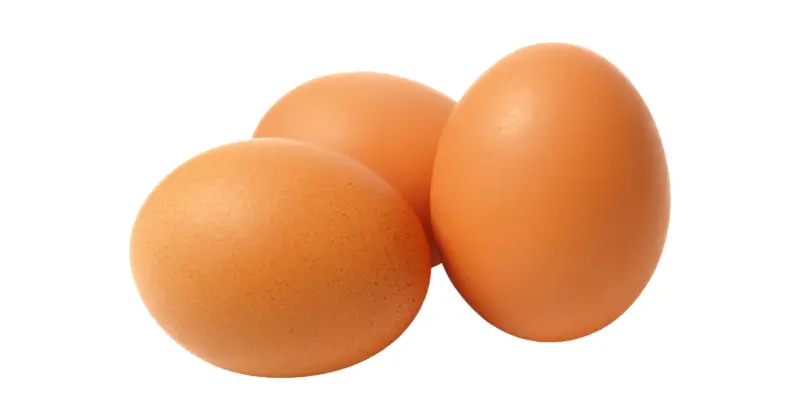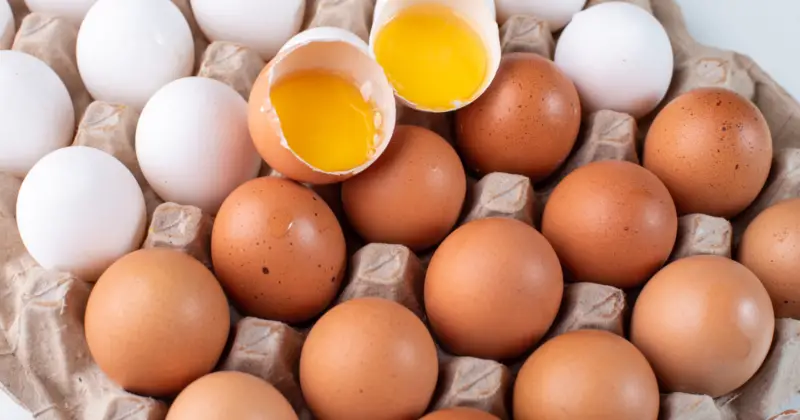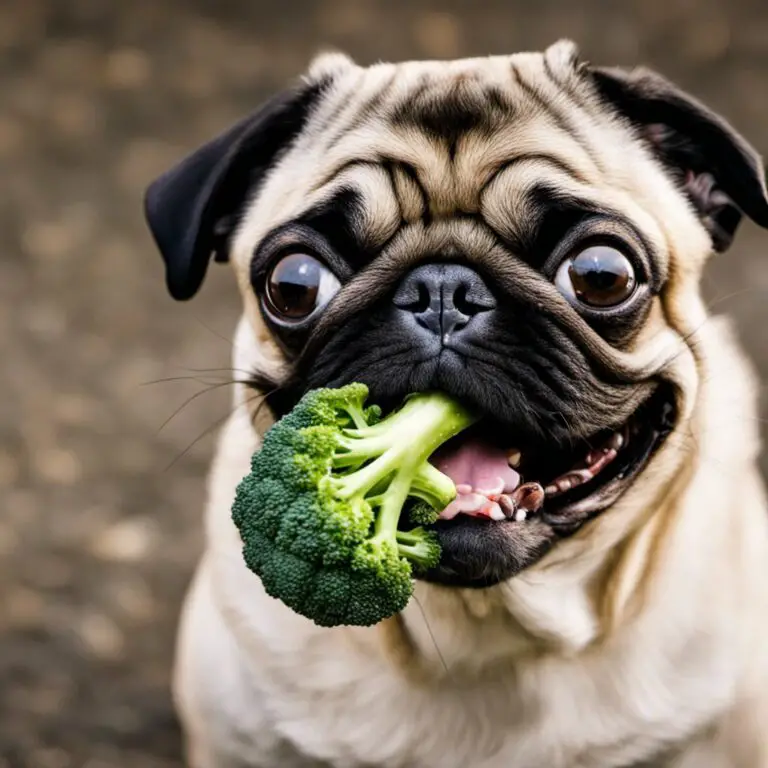Can Pugs Eat Eggs? A Comprehensive Guide for Pug Owners

As a pug owner, you might wonder, “Can Pugs Eat Eggs”. You’re not alone in this thought, as many dog owners want to provide a healthy diet for their pets while incorporating safe human foods. You’ll be happy to know that, in general, eggs can be a healthy and nutritious option for your pug.

Eggs are known to be rich in proteins, fatty acids, vitamins, and minerals, all of which contribute to your pug’s growth and development. Organically raised eggs from free-range farm chickens are the best choice for your pug’s diet. However, it’s essential to gradually introduce eggs into their diet to make sure they don’t have any adverse reactions.
With this information in mind, let’s delve deeper into the benefits of eggs for pugs and methods to safely feed them eggs. Keep reading to learn more about this nutritious food option for your furry friend.
Contents
Table of Contents
Basic Concepts: Can Pugs Eat Eggs

Like other dog breeds, pugs can benefit from a well-rounded diet that includes proteins, carbohydrates, and healthy fats. Incorporating eggs into your pug’s diet might be considered in this context. Eggs are a nutritious source of protein, vitamins, and minerals, which can be helpful for maintaining a pug’s health.
Get The Free Food Eating Guide That Keeps My Pug Happy and Playful Even at 13 Years Old
100% Beginner Friendly & Lists Real Foods Your Pug Can Actually Eat!

Pugs can eat eggs in moderation, as they provide essential nutrients such as protein, folate, vitamin A, selenium, riboflavin, iron, and vitamin B12. Protein is an important part of a healthy diet for pugs as it plays a vital role in building and repairing muscles and body tissues. However, it is important to remember that feeding eggs in moderate amounts is crucial, as excessive consumption can lead to potential health issues.
There are some factors to consider when offering eggs to your pug. Firstly, cooked eggs are better for pugs as they eliminate any potential risks associated with raw eggs, such as salmonella, which can cause severe illness in dogs.
On the other hand, raw egg whites contain avidin, a protein that can interfere with the absorption of biotin, a B vitamin essential for maintaining healthy skin and coat. Thus, cooking the eggs also neutralizes avidin, ensuring that your pug can safely consume them.
Another consideration is whether to include eggshells in the pug’s diet. Some pet owners claim that eggshells can be a good source of calcium for dogs. While it is true that they are rich in calcium, it is important to ensure they are properly cleaned, ground, and mixed with the cooked egg to avoid any choking hazard. Consulting a vet before adding eggshells to your pug’s diet is advisable.
In conclusion, pugs can safely eat eggs when offered in moderate amounts and cooked thoroughly. Eggs can provide essential nutrients to support a pug’s overall health but always prioritize a balanced and varied diet.
Health Benefits of Eggs for Pugs

Eggs are a nutritious and beneficial addition to a pug’s diet, as they contain a variety of essential nutrients, vitamins, and minerals. For instance, eggs are a great source of protein. When cooked, the protein in eggs becomes biochemically available to pugs, making it easy to digest and utilize by the body. Moreover, eggs feature all essential amino acids, qualifying them as a complete protein source.
Besides protein, eggs also provide essential vitamins and minerals for a pug’s overall health. Vitamin A found in eggs contributes to a shiny and healthy coat while promoting growth, particularly in younger pugs. If a dog has a dry, dull, or itchy coat, incorporating eggs in their diet can provide the necessary Vitamin A to address the issue source.
Furthermore, eggs deliver significant amounts of iron, crucial for proper blood circulation and oxygen transportation throughout the body. They are also a source of other essential vitamins and minerals such as Vitamin B12, selenium, phosphorus, vitamin D, and folate, contributing to a well-rounded and nutritionally balanced diet for pugs source.
In conclusion, incorporating eggs into a pug’s diet offers multiple health benefits, ranging from maintaining a healthy skin and coat to providing essential vitamins and minerals to support overall well-being and vitality.
Types of Eggs and Serving Methods

When considering feeding eggs to your pug, it’s important to understand the different types of eggs and the various serving methods. Some options include raw eggs, cooked eggs (such as scrambled, boiled, or hard-boiled), and even incorporating eggshells into their diet.
Raw eggs: While some pet owners might be tempted to serve raw eggs to their pugs, it is generally advised against this practice. Raw eggs could contain salmonella bacteria, which can make both you and your pug ill. Also, raw egg whites contain avidin, a protein that can interfere with your pug’s ability to absorb certain nutrients from their food.
Cooked eggs: Cooked eggs, on the other hand, are a more suitable and safer option for your pug. Options for cooked eggs include:
- Scrambled eggs: Providing your pug with plain scrambled eggs can be a great source of protein for them. It’s important, however, to serve them without any seasoning, as certain spices or additives can be toxic to dogs.
- Boiled eggs: Boiled eggs, either soft- or hard-boiled, are another viable choice. The boiling process retains most of the egg’s nutritional value, making it a healthy addition to your pug’s diet.
- Omelet: Serving your pug a simple omelet with no added ingredients is another way to offer cooked eggs. Remember to avoid adding any seasoning or potentially harmful ingredients to the omelet.
Eggshell: Some dog owners choose to provide ground eggshells as a source of supplemental dietary calcium for their pets. If you decide to add eggshell to your pug’s food, ensure that the shell is washed and ground properly to avoid any risk of injury or choking.
In conclusion, when offering eggs to your pug, ensure they are cooked and unseasoned. Monitor their reaction to determine if eggs agree with their system and can become a regular part of their diet.
Potential Risks of Feeding Pugs with Eggs

Feeding eggs to your pug can give them important nutrients, but it’s essential to be aware of the potential risks involved. One of the major concerns when feeding pugs raw eggs is the risk of salmonella. Salmonella bacteria can cause a serious illness called salmonellosis, which can lead to symptoms like fever, vomiting, and diarrhea1.
Another potential risk includes allergic reactions. Although it’s uncommon, some dogs can be allergic to eggs, resulting in itchy skin, hives, or difficulty breathing 2. To minimize the risk of an allergic reaction, it’s recommended to introduce eggs in small amounts and observe for any signs of an allergy in your pug.
Feeding raw egg whites to pugs is also discouraged as they contain a protein called avidin, which can lead to biotin deficiency3. Biotin is an essential vitamin that helps with healthy skin, coat, and digestion. To avoid this, cooking the eggs before feeding them to your pug is better.
Avoid adding salt or spices to the eggs to ensure your pug doesn’t suffer from an upset stomach. Excessive salt can lead to sodium ion poisoning, resulting in symptoms like vomiting, diarrhea, and more severe complications4.
Providing cooked eggs in moderation can offer numerous health benefits to your pug, but it’s important to be aware of the potential risks and take necessary precautions. By feeding cooked eggs mindfully and monitoring your pug’s reaction, you can help them safely enjoy the nutritional benefits while minimizing the risks.
Can Pugs Eat Eggs? Watch this
Importance of Moderate Egg Intake
Eggs are a nutritious and beneficial addition to a pug’s diet, as they are rich in protein, fatty acids, vitamins, and minerals. However, moderation is key when feeding eggs to your pug. Overconsumption of eggs may lead to health issues, such as obesity, weight gain, and related concerns, including heart disease.
Feeding your pug an appropriate amount of eggs is vital in ensuring they maintain a healthy weight and avoid becoming overweight. Obesity in pugs may cause heart problems and lead to joint and mobility issues due to the additional strain on their joints. To prevent these issues, always make sure to incorporate eggs into your pug’s diet in a controlled and balanced manner.
Additionally, introducing eggs too quickly or feeding excessive amounts can potentially cause an adverse reaction in your pug. It’s best to introduce eggs slowly into their diet, making sure they do not exhibit any signs of intolerance or discomfort.
One more factor to consider is the preparation of eggs for your pug. Cooked eggs are generally safer, as they help in lowering the risk of salmonella, biotin deficiency, and potential allergic reactions. Cooking eggs enhances their digestibility and ensures your pug gets the maximum nutritional value.
To sum up, eggs can be a valuable addition to your pug’s diet, but practicing moderation and proper preparation is essential to ensure your pet remains healthy and happy.
Considerations Before Feeding Eggs to Pugs

Eggs are known to be a nutritious food, containing a good amount of protein, amino acids, fatty acids, and various vitamins and minerals that contribute to the growth and development of our canine companions. However, before adding eggs to your pug’s diet, there are a few considerations to remember.
First, always consult with your veterinarian. They will best understand the specific needs of your pug and can provide tailored advice that suits their life stage and health status. While eggs can be a good source of calcium and other nutrients, it is critical to obtain a professional opinion to ensure a balanced diet that contributes to your pug’s overall health.
When feeding eggs to pugs, moderation is key. Though eggs contain beneficial nutrients, consuming too many can lead to issues such as an upset stomach or even biotin deficiency, which can cause lethargy and skin problems. It is essential to provide an appropriate portion size and frequency based on your pug’s size and activity level.
Another important consideration is how to prepare the eggs. Cooking the eggs in a small amount of oil can be a good method, as it allows for better absorption of nutrients while minimizing the risk of bacteria such as salmonella. However, refrain from using excessive amounts of oil or other fatty additions to prevent unnecessary caloric intake.
When feeding cooked eggs to pugs, make sure to remove the eggshells. Although eggshells can be a source of calcium, they can also pose a choking hazard or cause injury to your pug’s digestive system. It is best to provide calcium through other sources or supplements.
Finally, remember that eggs should not replace your pug’s regular meals but rather be offered as an occasional treat. This ensures that your pug maintains a balanced diet and continues to receive all the necessary nutrients for a healthy life.
By taking these considerations into account, you can confidently and safely include eggs in your pug’s diet, providing them with a tasty and nutritious treat.
Alternatives to Eggs

Pugs can enjoy a variety of other healthy and delicious treats besides eggs. As a pug owner, you can provide a well-rounded diet for your furry friend by incorporating different fruits, vegetables, and proteins into their meals.
Chicken and turkey are excellent alternatives to eggs, as they are lean sources of protein. Both can be boiled or baked without seasoning, added to your pug’s regular meals, or offered as occasional treats. Be sure to remove any bones to avoid choking hazards.
Fruits like watermelon, apples, bananas, blueberries, strawberries, and pineapple are also safe for pugs to consume in moderation. Rich in vitamins, minerals, and fiber, these fruits can provide health benefits and satisfy your pug’s sweet tooth. Always remove any seeds or cores before feeding them to your pug, and serve the fruits in small, bite-sized pieces.
Vegetables should also be part of your pug’s diet. Carrots, broccoli, and green beans provide essential nutrients and can be given raw, steamed, or cooked without any added oils or seasonings. Tomatoes, however, should be avoided as they contain solanine, which can be toxic to dogs.
When preparing meals and treats for your pug, it’s best to avoid spices as they can upset your pug’s stomach. Stick to plain, unseasoned options to keep your pug’s digestive system happy and healthy.
In conclusion, providing a variety of healthy, dog-safe foods like chicken, turkey, fruits, and vegetables can be a wonderful way to supplement your pug’s diet and offer alternatives to eggs. Remember always to monitor your pug’s reactions to new foods and consult with your veterinarian if you have any concerns.
FAQs: Can Pugs Eat Eggs

Are eggs safe for pugs to consume?
Yes, eggs are totally acceptable for pugs to eat but only in moderation. They are abundant in protein, fatty acids, vitamins, and fatty acids, all of which aid in pug puppy growth and development.
Should eggs be cooked or raw for pugs?
It is recommended to cook eggs for pugs. Raw eggs can carry the risk of salmonella or other bacteria. Cooking the eggs eliminates potential harmful pathogens and ensures a safer meal for your pug.
How often can pugs eat eggs?
Pugs can eat eggs in moderation, but it is not recommended to serve them daily. It’s essential to maintain a balanced diet for your pug, which includes a variety of food items. Eggs can be a valuable treat or occasional supplement to their regular diet.
Can pugs eat eggs with cheese?
In small quantities, pugs may eat eggs with cheese. However, it’s essential to remember that some dogs may be lactose intolerant or sensitive to dairy products. It’s always best to consult your veterinarian before introducing cheese into your pug’s diet.
What is the recommended number of eggs for pugs per week?
There isn’t a specific number of eggs recommended for pugs per week, as this will vary depending on your individual pug’s dietary needs. As a general guideline, you may consider offering eggs as an occasional treat or supplement, not as a daily meal. Always consult your veterinarian for personalized nutritional advice for your pug.
What is the best way to serve eggs to pugs?
The best way to serve eggs to your pug is by cooking them, such as boiling or scrambling without adding any spices or seasonings. Cooked eggs are easier to digest and carry a lower risk of harmful bacteria. Be sure to let the eggs cool down before serving them to your pug.






